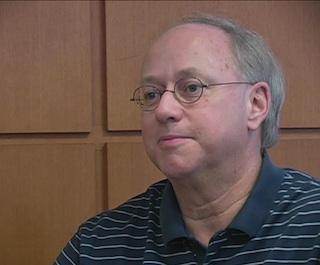
Roche Research Center
Hoffmann-La Roche Inc.
David Fry is a research scientist at the Hoffmann-La Roche Research Center in Nutley, NJ. In this interview, Dr. Fry discusses his work on the development of cancer drugs that target protein:protein interactions. Specifically, his work is directed at disrupting the interaction between the p53 and MDM2 proteins.
Interview Questions
About Dr. David Fry
(Time:
0min
9sec
)
How did you first get involved in medical research?
(Time:
1min
5sec
)
How did you begin working specifically on cancer?
(Time:
0min
31sec
)
How do you decide what to target in cancer cells?
(Time:
0min
55sec
)
How do you go about deciding which chemicals to test?
(Time:
0min
54sec
)
Where do you get the chemicals to test?
(Time:
0min
28sec
)
What are desirable properties in drugs?
(Time:
1min
14sec
)
How do you test the new candidate drugs?
(Time:
0min
32sec
)
Have you had any success in identifying drug candidates?
(Time:
0min
25sec
)
Do you use computers to help with drug design?
(Time:
0min
35sec
)
Do you see an increasing role for computers in drug development?
(Time:
0min
29sec
)
What new tools are being used to help identify new drugs?
(Time:
1min
6sec
)
